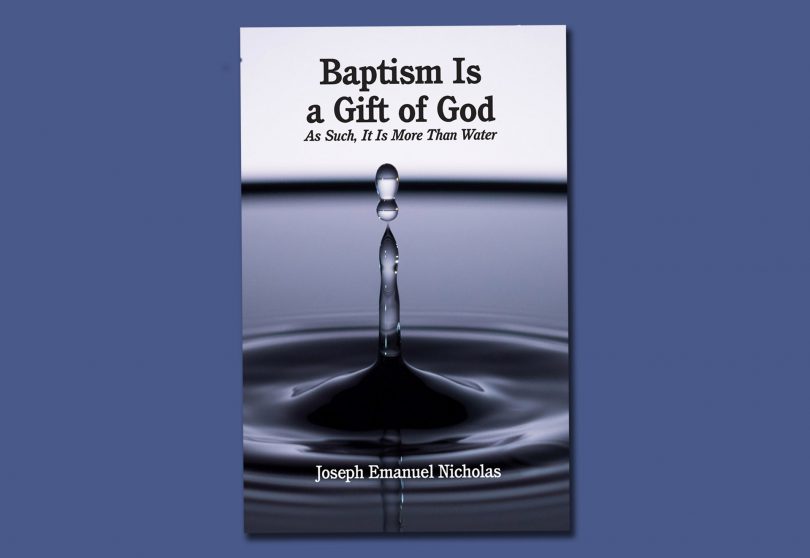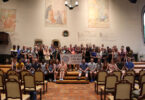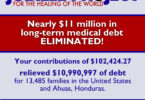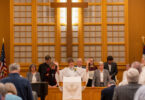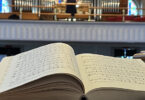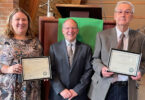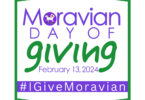The Rev. Joseph Nicholas, a retired Moravian pastor living in Washington, D.C., recently independently published a book on baptism entitled, Baptism is a Gift of God: As Such, It Is More Than Water. In this article, Brother Nicholas shares his thoughts on the book.
This book is very much a reflection of my own journey as a Moravian growing up in the context where fellow believers constantly questioned the value of your faith-based almost solely on the form of your baptism. As a pastor, I always seek to provide some conversation with parents and godparents before baptism.
I wrote this book as an invitation for us as believers in Jesus Christ to come together with a determination to teach and also to learn. This book is not a judgment on who has the right or wrong understanding. I found that generous atmosphere most profoundly in the Miami Gardens Pastors’ Group with more than a dozen church traditions involved and covering a very wide cross-section. I am convinced that the enemy has caused us to be in conflict over this matter as we seek to bring together the very important practice of Christian baptism with our passionate commitment to our Lord.
The title of the book comes directly from the language of our Baptism Liturgy. Christian baptism was instituted by our Lord Jesus and thus, as a gift of God, it is surely more than water.
The first of ten chapters in this book discusses the relationship between Jesus and John. The focus is on their early beginning and of the family and community connections as they were circumcised and grew up as typical Jewish boys. It makes the point that John’s blessing and endorsement at Jesus’ baptism launched his public ministry. It was not for the forgiveness of sin.
The second chapter discusses baptism as a Witness to the World and seeks to make the case that the baptisms referenced in Acts were largely to show that the Gospel was reaching to the ends of the world by the variety of people and places which were covered.
The chapter entitled Symbols and Symbolisms discusses our willingness to appreciate that communities have their own language that can help us to dig deeper into the “baptisms” and “washings” of those times. The next chapter, Holy Scripture and Holy Spirit, draws attention to the how the actions of the disciples came out of their understanding of the work of the Holy Spirit; and it is that response that now provides most of our references to baptism in the form of Holy Scripture.
In chapter five, Sin and Salvation, there is the theme that probably drives the baptism conversation more than anything else. Whether asked or not, it hangs around the depth of emotions, “Are our sins forgiven without a particular form of baptism?”Another way of framing the question would be, “Can we be saved without baptism?” The following chapter, Children and Citizenship, focuses on the ability of a child to be given an inheritance but due to age restrictions, that child cannot have direct access until the appropriate time designated. That does not prevent the giver from providing it. There is no doubt who is the owner!
In chapter seven The Community of the Covenant, there is the reminder that our relationship with God is in the context of the covenant. That covenant is with the community of faith. To be a part of that community is to share in the covenant. Then, a covenant is sealed and confirmed with a symbol. The suggestion here is that it is the commitment that precedes the application of water that gives value to the covenant relationship in baptism.
In chapter eight, Examples of Emergencies and Exceptions, the essential piece is that in our human context, we know of children who die before they ever get close to any kind of baptism. There are adults who will never grow up to understand and to speak as some require before they can be baptized. Will the God of love reject them?
Chapter nine discusses The Roman Church, Reformation and Reaction and it shows that the Church really needed new ways and a new understanding of itself. The process started long before Martin Luther in the 16th century but his timing was the most impactful and led to major questions and new answers. It shows that the reformers did not all agree either. However, once the questioning started, there was no turning back and some of the reactions have continued to challenge and to shape how the worldwide Church sees itself.
Finally, we close with chapter ten: Meaning for Moravians. In as much as we have often seen ourselves as not strong on outlining our doctrinal positions, in a growing number of communities, some of those doctrinal positions are being defined and the leadership of the church has had to find ways of responding. We are invited to look again at what are our essentials. We are urged to offer ministry in context of our local situation and also with our eyes on eternity; not just for ourselves but also for those whom God sends to us especially in irregular ways.
Enjoy reading and many blessings!
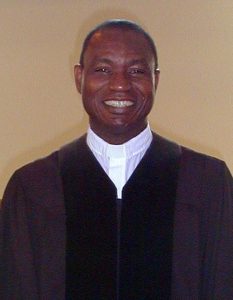 The Rev. Joseph Nicholas has served Moravian congregations in Antigua, Barbados and Miami, and was Moravian Warden and Lecturer of the West Indies/University of the West Indies. He currently lives in Washington, D.C. and helps at Trinity Moravian Church in New Carrollton, Md. Baptism is a Gift of God is available from the IBOC at store.moravian.org and on Amazon.
The Rev. Joseph Nicholas has served Moravian congregations in Antigua, Barbados and Miami, and was Moravian Warden and Lecturer of the West Indies/University of the West Indies. He currently lives in Washington, D.C. and helps at Trinity Moravian Church in New Carrollton, Md. Baptism is a Gift of God is available from the IBOC at store.moravian.org and on Amazon.

